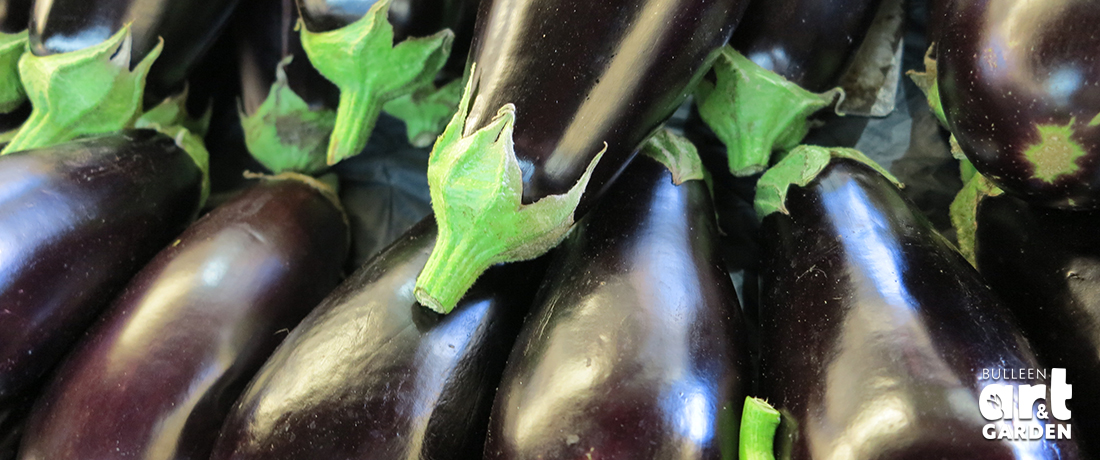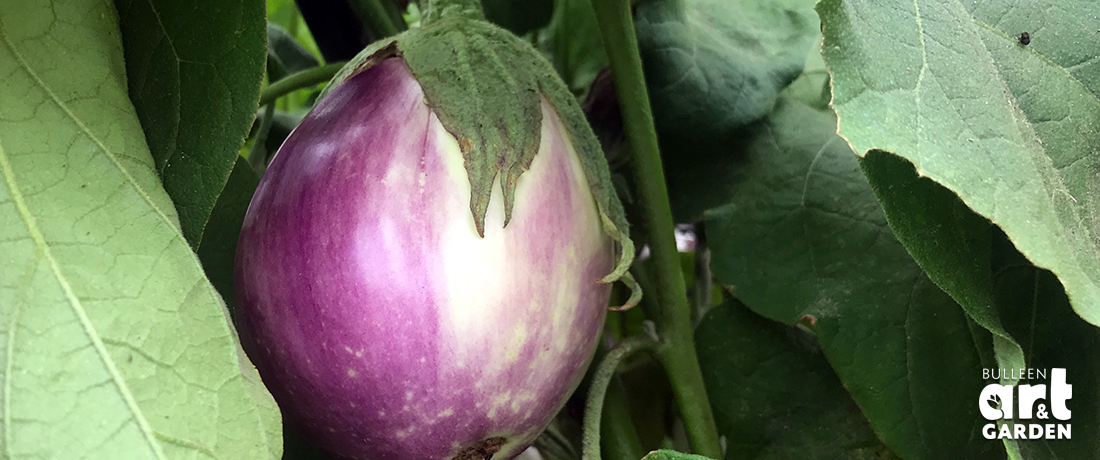
 Important note about plant availability. Important note about plant availability.There are hundreds of factsheets on our website provided for your information. Not all plants will be available at all times throughout the year. To confirm availability please call (03) 8850 3030 and ask for the nursery. |
Eggplants (Solanum melongena), also known as aubergines, are a member of the Nightshade (Solanaceae) family to which tomatoes, potatoes and peppers also belong. They are not a naturally occurring species but were possibly cultivated in India or China in the distant past. Their origins are a bit of a mystery but the earliest references in Sanskrit literature may date to 300 BC and many references have also been found in ancient Chinese literature, the earliest in 59 BC.
The eggplant fruit, which is technically a berry just like a tomato, can be a glossy purple, white or green colour and may vary considerably in shape and size, but all eggplants have the same delicious rich, complex flavour.

Plants are bushy with attractive purple flowers and spiky stems, growing under 1m in size, though some varieties are quite small, only growing to 40cm, making them ideal for growing in pots.
Eggplants are tropical/subtropical plants which are perennial in warmer climates, but in temperate climates such as Melbourne they don’t survive through winter and are treated as annuals.
Growing Eggplants
Eggplants can be grown from seeds or seedlings. Just like tomatoes, eggplant seeds should be planted as early as possible around springtime, and can be sown in trays indoors up to 8 weeks before transplanting time. In Melbourne’s temperate climate, sow seeds indoors during August and September, then harden them off by putting the seedlings outside in full sun for a week before planting.
Whether you raise your own seedlings or buy them, they can be transplanted into the garden once the chance of frosts has passed. Space the plants 60-75 cm apart in the garden.
The growing conditions for eggplants are similar to tomatoes, they require full sun and have high water requirements, but being slower growing that tomatoes they need a longer hot growing season. In cool temperate areas where the growing season might not be long enough, choose varieties with small slender fruit as they ripen faster.
The best place in the garden for eggplants is in the warmest, sunniest location you can find. They’ll do even better if they’re planted against a wall, as the radiated heat will help keep them warm when night temperatures drop.
If you’re growing more than one variety of eggplant and wish to save the seeds, keep in mind that they can cross-pollinate!
Mulch plants well to conserve water. Water regularly to prevent blossom end rot of fruit and to keep the plants productive. Additionally, larger plants that are over 60cm tall may need staking to support them.
If you’re planting eggplants with other vegies in your garden bed, they’re compatible with beans, capsicum, lettuce, amaranth and thyme. Avoid planting eggplants in the same garden bed as potatoes, as bacterial wilt of potatoes which is caused by a soil-borne bacterium also affects eggplants.
Maximising Yields
One way to increase fruiting is to create more fruit-bearing stems by pinching out the main tip when plants reach 30cm in height. This will make the plant bushier and encourage the formation of sideshoots.
Another way to increase productivity is by pollinating more flowers. Either tap the flowers to release pollen to promote pollination or use a soft paintbrush to hand pollinate them.
Providing nutrients when the plant needs them most also improves productivity. Once the plants begins fruiting, feed every two weeks with a liquid fertilizer for vegetables, such as a fish emulsion based fertilizer.
Harvesting
Eggplants are ready to harvest in 12-15 weeks. Picking the fruit regularly encourages further production. The fruit is ripe when it is glossy and has attained its full colouring. Remove the fruit with secateurs or a sharp knife, leaving around 3cm of stem attached to the fruit. A productive plant should produce up to 8 fruit.
Pests and Diseases
Eggplants can be prone to red spider mites, especially if the plant is weakened through lack of watering. Water regularly and mist the foliage during hot dry weather to deter red spider mites as they prefer dry conditions.
Aphid problems can be dealt with simply by hand-picking or hosing off the pests with a spray of water using a trigger nozzle every two to three days.
Blossom end rot can be a symptom of infrequent watering but can also be due to a calcium deficiency which can be remedied by the addition of lime.
Dark spots on the leaves which expand and dry the leaf out are caused by a fungal leaf spot disease. Remove diseased leaves to prevent its spread, and dispose of any fallen leaves as the fungus can survive over winter on fallen leaves in soil. The best prevention is to water plants in the morning so plants can dry during the day, and if watering in the afternoon avoid wetting the foliage.
